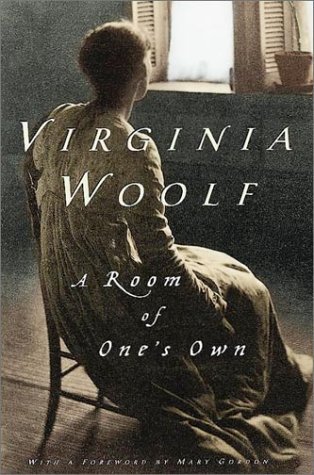
This is the first work I have read by Virginia Woolf, and I think it a good introduction to the rest of her novels. “A Room of One’s Own” is a nonfiction work about Woolf’s reasoning as to why women are largely missing from fiction, both as writers and authentic characters.
Her main argument is that in order for women to be successful writers of fiction, they need a room of their own and a steady income—a place away from distractions, and an income so they can focus on themes of their own interest, and not the pain and shame of not having money to support oneself.
She begins by rhetorically wondering why women had not been active writers until the 1800s, with the boom that includes Jane Austen and the Brönte sisters. “But what I find deplorable, I continued, looking about the bookshelves again, is that nothing is known about women before the 18th century…Here I am asking why women did not write poetry in the Elizabethan age, and I am not sure how they were educated; whether they were taught to write…”
She then continues through history, from a woman’s point of view, and comes to the boom of the 1800s. “Thus, towards the end of the eighteenth century a change came about which, if I were rewriting history, I should describe more fully and think of greater importance than the Crusades or the Wars of the Roses. The middle-class woman began to write.”
And not just write, in Woolf’s opinion: they began to write about other themes than domesticity, which before this time had been the only point of description. This discovery, that women have “other interests besides the perennial interests of domesticity” has long been known to women, according to Woolf—it is men that keep forcing the topic.
Woolf’s conclusion, besides the fact that women need a space of their own and an income to go with it in order for them to be successful writers, is that men and women also need equality. Not only for the basic reasons, but also because literature, and thus society and history, are deprived when one of the sexes is oppressed and stripped of their rights.
If men were “only represented in literature as the lovers of women” as women have been portrayed for centuries, then “literature would be incredibly impoverished, as indeed literature is impoverished beyond our counting by the doors that have been shut upon women.”
She also argues against one sex using the writing techniques and styles of their sex alone: a balance is needed for novel or other work of literature to be the best it can be. “It is fatal to be a man or woman pure and simple; one must be woman-manly or man-womanly” and combine both emotion and reason into their writing.
Woolf is a prime example of the feminist in the 1900s: yes, women had achieved the right to vote, to work outside the home, and other basic rights that before they had been deprived of. But Woolf knows that there is more work to be done: when she tries to visit the university library, she is denied entrance because she needs a man to introduce her. When she is walking along the river, a man helpfully informs her that she should be accompanied by a man if she wants to walk there.
In her daily life Woolf experiences demoralization and discouragement simply because she is a woman, and through her work she tries to describe the shortcomings of society as she sees them, in an attempt to change them not only for herself, but also for future generations.